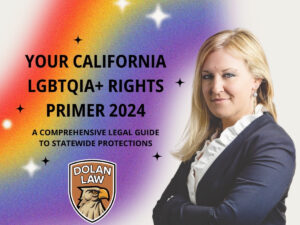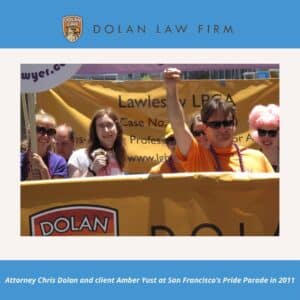
This week’s question comes from Debbie D in the Castro who asks: “With all the hate coming out of Washington and the federal government trying to push back LGBTQ rights I heard that California is moving in the other direction. I’m glad I live in California. What is our State Government doing for us?”
Debbie, it is indeed a troubling time in our nation’s history and we are lucky to live in a progressive state like California, where we have the strongest transgender rights protections in the nation. Under the Obama Administration, the Equal Opportunity Employment Commission (EEOC) interpreted the law prohibiting discrimination based on sex to include sexual stereotypes (i.e. what is feminine, masculine, etc.) to preclude discrimination based on sexual orientation, gender identity and trans status. Unfortunately, as administrations change so do the priorities — and often the department heads — of these important regulatory bodies.
Though federal anti-discrimination laws do not expressly protect LGBTQ people from discrimination in employment, in California, the Fair Employment and Housing Act protects trans people from discrimination in employment and housing through the provisions of California Government Code Section 12940 and its related statutes.
California recently furthered the rights of elderly LGBTQ people by passing the Lesbian, Gay, Bisexual, and Transgender Long-Term Care Facility Residents’ Bill of Rights. This bill, SB 219, was sponsored by California State Senator Scott Wiener of District 11, which encompasses San Francisco, Daly City, Colma, Broadmoor, and parts of South San Francisco. As a member of the LGBTQ community and former San Francisco Supervisor, Scott has long been a champion of civil rights for all people in our diverse society.
In the findings part of the bill, which justified its enactment, the Legislature cited a 2011 study “Stories from the Field: LGBT Older Adults in Long-Term Care Facilities,” published by the National Senior Citizens Law Center which revealed that “43 percent of respondents reported personally witnessing or experiencing instances of mistreatment of LGBT seniors in a long-term care facility, including all of the following: being refused admission or readmission, being abruptly discharged, verbal or physical harassment from staff, staff refusal to accept medical power of attorney from the resident’s spouse or partner, discriminatory restrictions on visitation, and staff refusal to refer to a transgender resident by his or her preferred name or pronoun. Eighty-one percent of respondents believed that other residents would discriminate against an LGBT elder in a long-term care facility, 89 percent of respondents believed that staff would discriminate against an LGBT elder in a long-term care facility, and 53 percent believed that staff discrimination would rise to the level of abuse or neglect.” Though this was a national report, it included instances of severe discrimination within California.
The LGBT Care Facility Residents’ Bill of Rights makes it “unlawful, except as specified, for any long-term care facility to take specified actions wholly or partially on the basis of a person’s actual or perceived sexual orientation, gender identity, gender expression, or human immunodeficiency virus (HIV) status, including, among others, willfully and repeatedly failing to use a resident’s preferred name or pronouns after being clearly informed of the preferred name or pronouns, or denying admission to a long-term care facility, transferring or refusing to transfer a resident within a facility or to another facility, or discharging or evicting a resident from a facility.”
Pursuant to the law, it is unlawful for a long-term care facility or facility staff to take any of the following actions wholly or partially on the basis of a person’s actual or perceived sexual orientation, gender identity, gender expression, or human immunodeficiency virus (HIV) status: (1) Deny admission to a long-term care facility, transfer or refuse to transfer a resident within a facility or to another facility, or discharge or evict a resident from a facility; 2) Deny a request by residents to share a room; (3) Where rooms are assigned by gender, assigning, reassigning, or refusing to assign a room to a transgender resident other than in accordance with the transgender resident’s gender identity, unless at the transgender resident’s request; (4) Prohibit a resident from using, or harass a resident who seeks to use or does use, a restroom available to other persons of the same gender; (5) Willfully and repeatedly fail to use a resident’s preferred name or pronouns after being clearly informed of the preferred name or pronouns; (6) Deny a resident the right to wear or be dressed in clothing, accessories, or cosmetics that are permitted for any other resident; (7) Restrict a resident’s right to associate with other residents or with visitors, including the right to consensual sexual relations, unless the restriction is uniformly applied to all residents in a nondiscriminatory manner; or (8) Deny or restrict medical or nonmedical care that is appropriate to a resident’s organs and bodily needs, or provide medical or nonmedical care in a manner that, to a similarly situated reasonable person, unduly demeans the resident’s dignity or causes avoidable discomfort.
As our country appears to be moving away from protecting the rights of all Americans, I am proud to say that California stands firm through its pronouncements in law that equal rights shall be afforded to all.
Contact LGBT Rights Lawyers At the Dolan Law Firm
If you have been the object of discrimination, the fact that a law exists to protect you is only the beginning. You must be vigilant about protecting your rights both in the places where they have been violated and in court. At The Dolan Law Firm, we are dedicated to giving LGBT people that enforcement power. Please contact us for a free case evaluation.










